The Forest House Waldorf School is set in a peaceful forest. It offers a special learning experience for kids from kindergarten to sixth grade. The school follows Waldorf education and nature-based learning to help kids grow in all ways.
Learning outside is key at Forest House Waldorf School. The school sits on a 5+ acre wooded area. Here, kids learn by doing things like gardening and caring for animals. They also go on nature walks, which helps them love and protect the environment.
The teachers at Forest House Waldorf School really know how to help kids grow. They use music, stories, and art in lessons. This makes learning fun and exciting. For parents looking for a deep and meaningful education, Forest House Waldorf School is a great choice.
Key Takeaways
- Forest House Waldorf School provides a nurturing, nature-based educational experience for K-6 students
- The school’s wooded campus offers ample opportunities for outdoor learning and experiential education
- Waldorf-inspired curriculum emphasizes creativity, curiosity, and compassion
- Integration of music, storytelling, and art fosters an immersive learning environment
- Dedicated faculty cultivate each child’s unique capacities for personal growth
Introduction to Forest House Waldorf School
Forest House Waldorf School is set in a peaceful, natural area. It follows the green schooling, environmental stewardship, and biophilic design principles. The school’s location is key to its Waldorf education philosophy. It lets students enjoy nature, breathe fresh air, and explore the natural world.
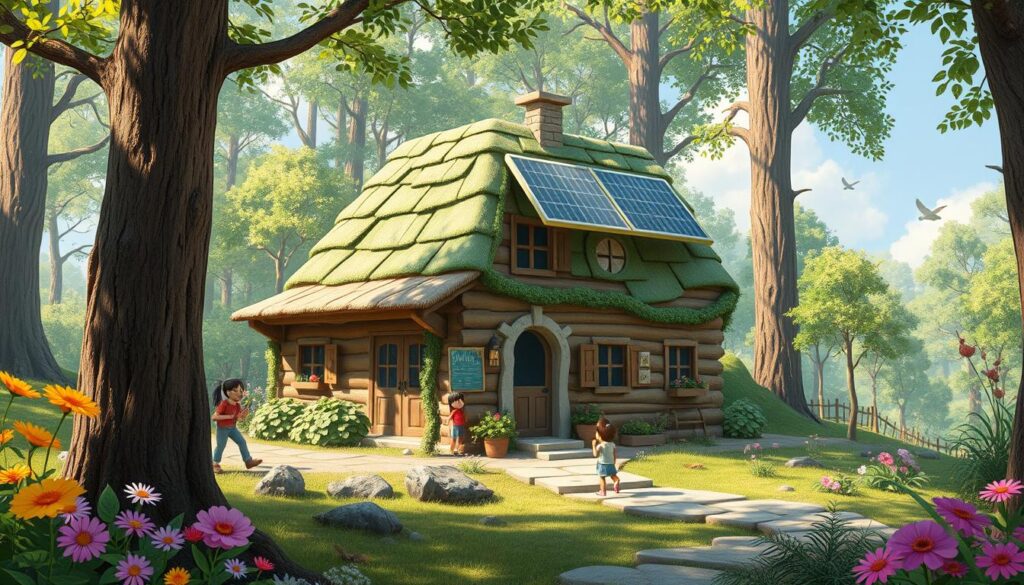
At Forest House Waldorf School, kids work with natural materials. They improve their observation skills and get to play in a caring environment. The school aims to give a balanced education based on Rudolf Steiner’s ideas. It tailors the curriculum to fit each child’s development and learning style.
| School Information | Details |
|---|---|
| Number of students | 80 |
| Nationalities represented | 14 |
| Max. students per class | 15 |
| Average students per class | 12 |
| Native English-speaking teachers | Yes |
| Additional language classes | Mandarin |
| Teaching assistants employed | Yes |
| Homework for Upper Primary | 45-60 minutes per day |
| School start time | 8:30 am |
| School finish time | 2:30 pm |
The school’s green schooling focus is seen in its sports activities. Lower primary kids play inclusive games. Upper primary kids do regular sports to improve fitness and coordination. This hands-on learning in nature builds a lifelong connection with the environment.
Forest House Waldorf School encourages learning through all senses. It helps kids develop problem-solving and critical thinking skills. The school also focuses on teamwork and communication. This helps kids build strong social skills and positive relationships with peers.
Forest House Waldorf School aims to promote the holistic development of all involved, fostering resilient, confident, independent, and creative learners.
The school has a team of skilled Forest School practitioners. They keep their skills sharp to provide a unique educational experience. This experience integrates biophilic design, ensuring students learn and grow with nature.
Waldorf Education Philosophy
Waldorf education, founded by Rudolf Steiner, focuses on the whole child. It supports their physical, emotional, and intellectual growth. This approach is recognized worldwide, with over 1,200 schools and nearly 2,000 kindergartens in 75 countries.
The United States, Germany, and the Netherlands have the most Waldorf schools. The United Kingdom is home to 29 Steiner schools.
Rudolf Steiner’s Teachings
Rudolf Steiner’s teachings are at the heart of Waldorf education. He believed in meeting each child’s unique needs at different stages. Steiner thought education should nurture creativity, imagination, and a love for nature.
“Our highest endeavor must be to develop free human beings who are able, of themselves, to impart purpose and direction to their lives.” – Rudolf Steiner
Holistic Approach to Child Development
Waldorf education looks at the whole child, not just their academics. It supports their growth and helps them connect with others. Key parts of this approach include:
- Encouraging a love for learning through engaging, age-appropriate lessons
- Fostering creative thinking and problem-solving skills
- Cultivating a sense of empathy, trust, and connection with the world
- Integrating arts, music, and movement into academic subjects
- Providing ample opportunities for outdoor play and exploration
Waldorf teachers come from diverse backgrounds. They bring their experiences and knowledge to the classroom. This diversity enriches the learning experience for students.
| Country | Number of Waldorf Schools |
|---|---|
| United States | Over 200 |
| Canada | Over 20 |
| United Kingdom | 29 Steiner schools |
| Republic of Ireland | 3 |
Waldorf schools aim to create well-rounded individuals. They focus on developing skills, creativity, and compassion. This prepares students for a changing world.
Curriculum Overview
The Forest House Waldorf School curriculum is designed to nurture the whole child. It combines arts, academics, and hands-on activities. This approach fosters a love for learning and helps students discover their unique talents. The curriculum meets the needs of children from preschool to middle school.
Age-Appropriate Learning
At Forest House, the curriculum matches the developmental stages of students. In early years, it focuses on play-based learning. This helps children grow curious, develop social skills, and improve their thinking.
As students get older, the curriculum becomes more academic. Yet, it still emphasizes artistic and practical subjects.
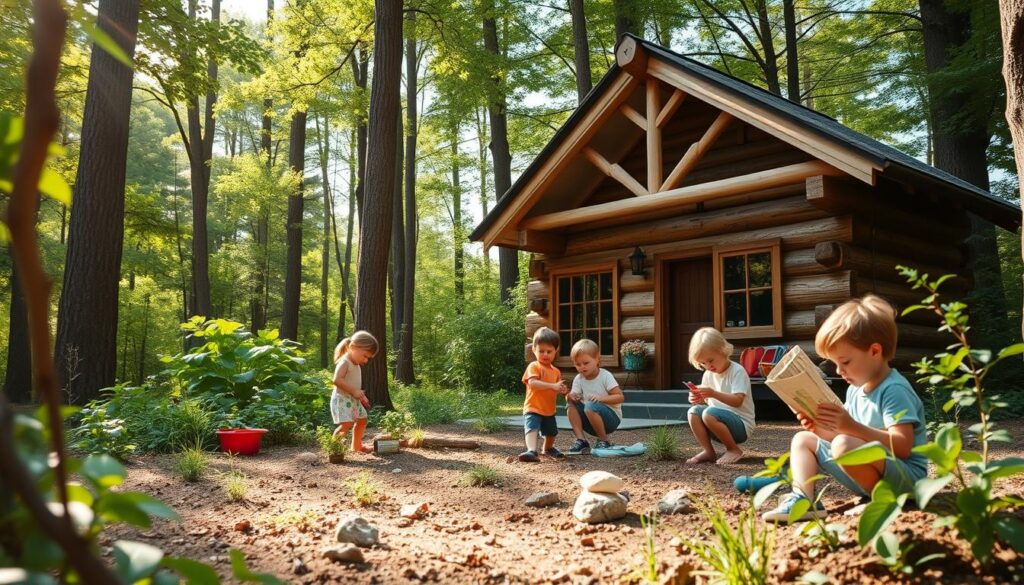
The school knows children have different needs at different ages. The curriculum supports these needs. For example, early grades focus on motor skills. Middle school emphasizes critical thinking and problem-solving.
Main Lesson Blocks
The Waldorf curriculum’s main lesson period is unique. It’s a two-hour block at the start of each day. Students dive into a subject like math, language arts, or science.
These blocks last three to four weeks. They allow students to fully immerse in the subject. The main lesson period is for hands-on activities like experiments and projects. This approach helps students understand subjects deeply and connect them.
Artistic and Practical Subjects
Forest House also offers a variety of artistic and practical subjects. These include music, drawing, painting, handwork, and woodworking. These subjects are key to the curriculum.
They help students grow creatively, improve coordination, and solve problems. These subjects are an essential part of the curriculum.
| Subject | Benefits |
|---|---|
| Music | Enhances cognitive development, improves memory and concentration |
| Drawing and Painting | Encourages self-expression, develops fine motor skills |
| Handwork | Promotes patience, perseverance, and attention to detail |
| Woodworking | Builds problem-solving skills, fosters a sense of accomplishment |
By including these subjects, Forest House ensures students get a well-rounded education. This education prepares them for success in all areas of life. The hands-on nature of these activities also deepens students’ appreciation for the world and their abilities.
The Role of Nature in Education
At Forest House Waldorf School, nature is key in learning. The school values environmental education a lot. It makes outdoor classrooms a big part of what students learn.
By being in nature often, students learn to love the environment. They grow into well-rounded people.
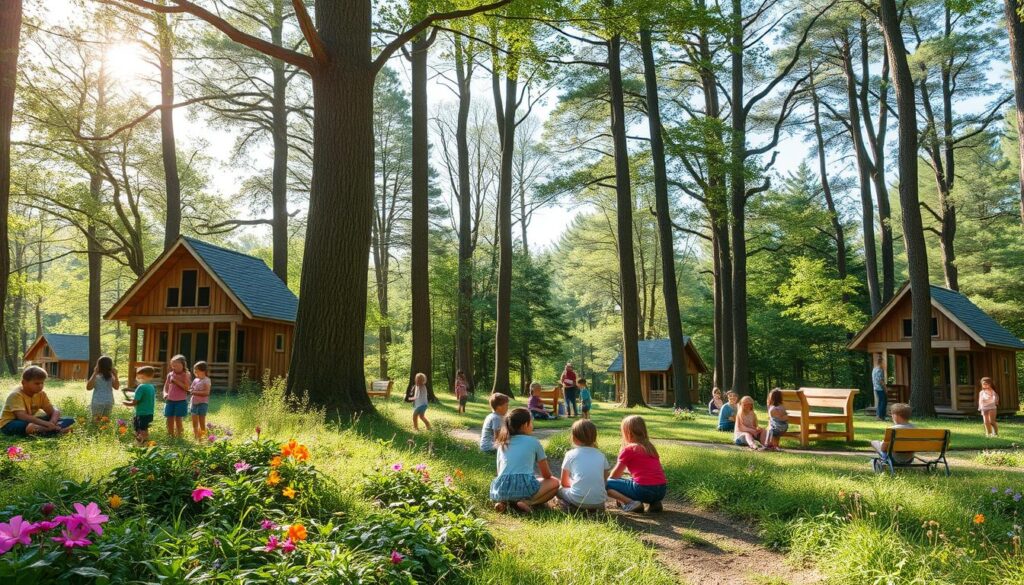
Outdoor activities are a big part of daily life at Forest House Waldorf School. Students do many things in nature, like:
- Cubby building
- Nature crafts
- Gardening
- Nature walks
- Flora and fauna exploration
These activities help kids connect deeply with nature. They learn to observe and understand ecosystems better.
“In the woods, children find calmness and can work out any excessive energy they may have. The natural environment provides a sanctuary where they can explore, discover, and learn at their own pace.” – Forest House Waldorf School Educator
Yale University research shows nature education’s benefits. The Forest Kindergarten at Forest House Waldorf School boosts:
- Immunity
- Focus
- Creativity
- Problem-solving skills
- Stress reduction
Forest House Waldorf School prepares students for success and life’s challenges. It teaches them to care for the environment. This way, students keep a lifelong bond with nature and become responsible stewards.
Nurturing Creativity and Imagination
Forest House Waldorf School focuses on creativity and imagination in learning. It values artistic expression and creative thinking in young children.
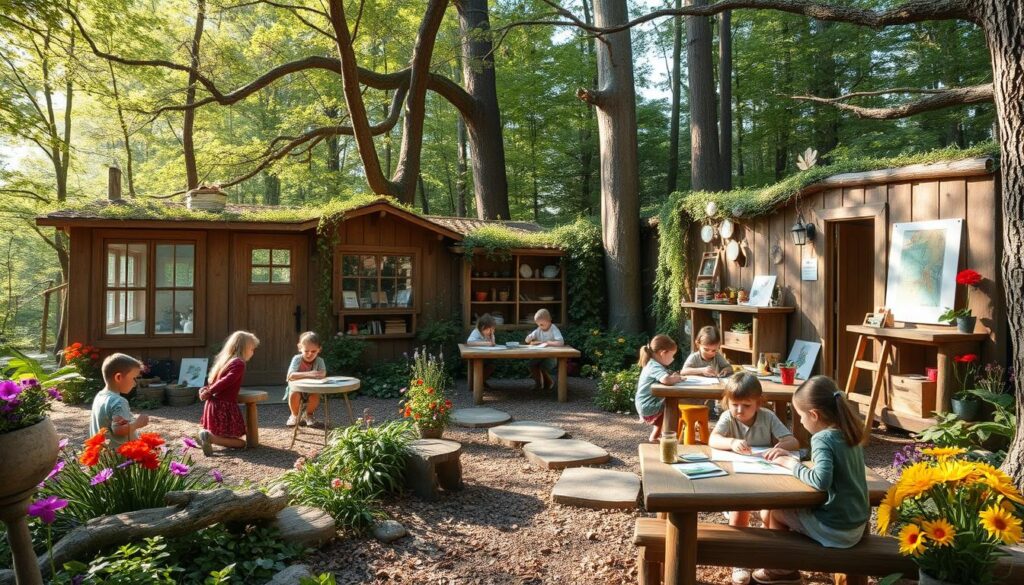
Students learn through stories, myths, and crafts. Fairy tales and legends teach life lessons and boost imagination. These stories help with problem-solving and communication.
Storytelling and Mythology
Storytelling is key in Waldorf education. It enhances language, culture, and storytelling skills. Teachers at Forest House Waldorf School make stories come alive, sparking a love for reading.
Exploring myths from different cultures broadens students’ views. It builds empathy and understanding for others.
Arts and Crafts
Art is vital at Forest House Waldorf School. Students do various crafts like beeswax modeling and painting. These activities boost creativity and fine motor skills.
Through art, kids express themselves and appreciate beauty. The school aims for a balance between thinking, feeling, and doing. This helps students understand themselves and the world.
“Imagination is more important than knowledge. Knowledge is limited. Imagination encircles the world.” – Albert Einstein
Forest House Waldorf School sees imagination as a key skill. It prepares students to face life’s challenges with creativity and compassion.
For parents wanting a creative learning environment, Forest House Waldorf School is a great choice. It fosters imagination and creativity, setting the stage for lifelong learning and success.
Academic Subjects
At Forest House Waldorf School, the academic curriculum aims to give students a balanced education. It focuses on their intellectual, emotional, and physical growth. The school values creativity and holistic growth, yet it also provides a solid foundation in core subjects like language arts, mathematics, and science.
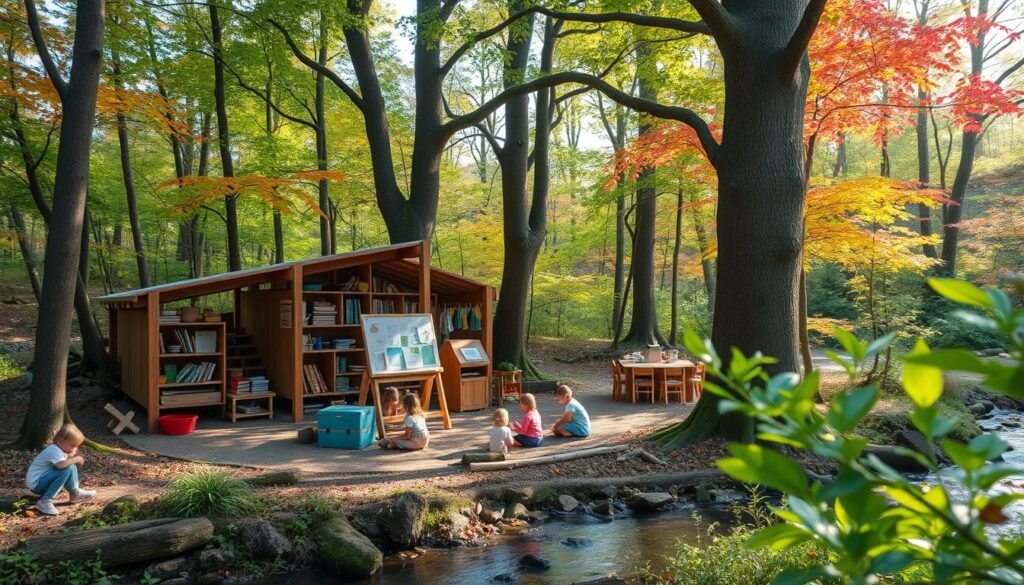
Language Arts
Language development is key in the Waldorf curriculum. Students learn various methods to improve their literacy, including phonics and writing. The school encourages a love for language and literature, helping students to express themselves creatively.
Mathematics
Mathematical thinking grows from concrete to abstract concepts. Early grades use stories and practical examples to introduce math. As students get older, they learn about fractions, long division, and geometry. By Grade 8, they study Algebra I and statistics.
| Grade Level | Mathematical Concepts Covered |
|---|---|
| Grade 1 | Numbers up to 24, addition, subtraction, multiplication, division |
| Grade 4 | Fractions, long division, averages, simple geometric forms |
| Grade 6 | Percentages, business math, geometry, statistics |
| Grade 8 | Algebra I, organic chemistry, computer science |
Science
Science education at Forest House Waldorf School focuses on observation and hands-on learning. Students learn about nature, including the four elements and ecological systems. As they grow, they study physics, chemistry, and astronomy.
“Our academic curriculum is designed to ignite curiosity, foster critical thinking, and instill a lifelong love for learning in our students. By providing a balanced approach that integrates the arts, practical skills, and rigorous academics, we aim to prepare our students for success in their future endeavors.”
– Forest House Waldorf School Faculty Member
Forest House Waldorf School offers a comprehensive curriculum that blends creativity, nature, and academics. This ensures students get a well-rounded education, ready for the 21st century.
Social and Emotional Development
At Forest House Waldorf School, we know how vital social skills and emotional intelligence are. We use group activities, projects, and plays to help kids work together and communicate well. Our teachers also teach them how to solve conflicts and manage their feelings.
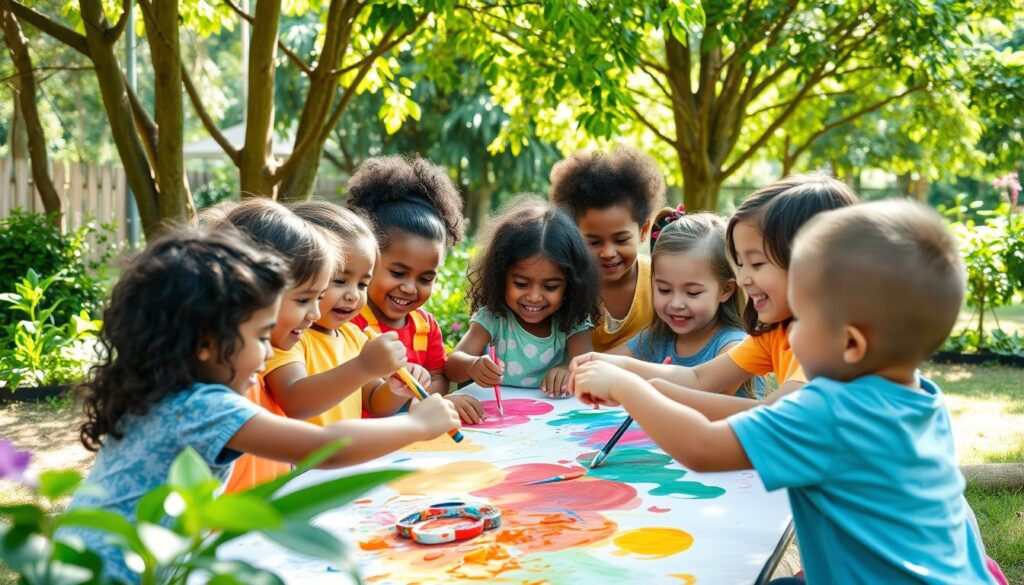
We create a caring space where kids learn to cooperate and understand each other. They take part in movement circles, storytelling, and group activities. These help them feel connected and learn to care for others.
“The greatest gift we can give our children is the ability to navigate their emotions and form meaningful relationships with others.” – Maria Montessori
Our approach to social and emotional growth includes:
- Encouraging open communication and active listening
- Facilitating cooperative learning experiences
- Providing opportunities for self-expression through art, music, and drama
- Teaching mindfulness and self-regulation techniques
- Modeling empathy, compassion, and respect in all interactions
| Age Group | Social and Emotional Development Goals |
|---|---|
| Kindergarten (3-6 years) | Developing self-awareness, empathy, and basic conflict resolution skills |
| Lower School (7-10 years) | Strengthening cooperation, communication, and emotional regulation |
| Middle School (11-14 years) | Enhancing social problem-solving, self-reflection, and leadership skills |
| Upper School (15-18 years) | Fostering independence, resilience, and effective conflict resolution strategies |
Forest House Waldorf School focuses on both social and emotional growth, along with academics. Our students leave with strong social skills, emotional smarts, and the ability to handle challenges. They are known for their interpersonal skills and emotional intelligence.
The Importance of Play
At Forest House Waldorf School, play is a key part of learning. It shows how important unstructured play and activities led by children are for growth. The school offers both indoor and outdoor play. This lets kids explore, create, and learn in a safe space.
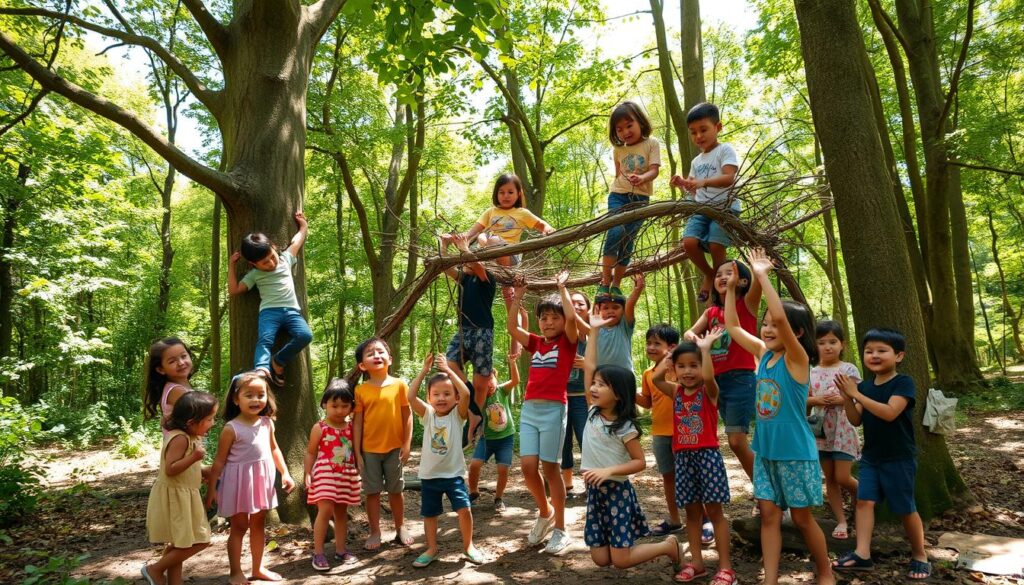
Outdoor Play and Exploration
Waldorf students at Forest House Waldorf School spend a lot of time outside. They play and explore freely. This time in nature has many benefits, such as:
- Developing gross and fine motor skills through building activities with natural materials
- Calming aggressive and anxious behavior, positively impacting mental health
- Improving physical and mental well-being through exposure to green environments
- Enhancing observation skills and fostering an appreciation for the natural world
- Reducing stress and promoting relaxation in both children and adults
Just 10 minutes in nature can greatly benefit a child’s health and happiness. It helps them feel joyful and confident, supporting their growth.
Imaginative Play
Waldorf teachers at Forest House Waldorf School also support imaginative play. They provide open-ended materials and supportive spaces. This play lets kids create their own stories and worlds, boosting their creativity and imagination. Nature-based activities like these are great for imaginative play, such as:
| Activity | Description | Benefits |
|---|---|---|
| Journey Sticks | Collecting natural items on a stick while hiking or exploring | Encourages observation, storytelling, and memory skills |
| Mud Faces for Trees | Creating faces on trees using mud, leaves, and other natural materials | Promotes creativity, imagination, and connection with nature |
| Clay Sculptures | Sculpting animals, dishes, beads, and other objects using natural clay | Develops fine motor skills, creativity, and self-expression |
| Outdoor Forts or Tents | Building structures using branches, leaves, and other natural materials | Encourages collaboration, problem-solving, and spatial awareness |
By focusing on play-based learning, Forest House Waldorf School supports the whole child. It helps with their physical, emotional, and cognitive growth in a natural and complete way.
“Play is often talked about as if it were a relief from serious learning. But for children, play is serious learning. Play is really the work of childhood.” – Fred Rogers
Festivals and Celebrations
At Forest House Waldorf School, seasonal festivals and cultural celebrations are key parts of learning. They mark the seasons, honor traditions, and teach important values. Students, staff, and families join in these community events, building unity and shared goals.
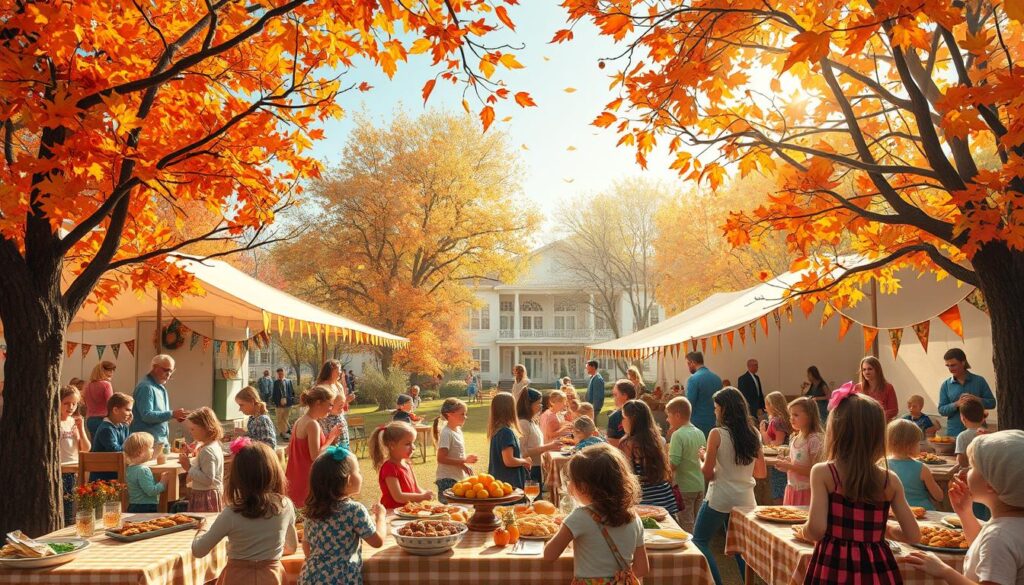
The school celebrates many festivals, like the First Day Celebration & Rose Ceremony, and Michaelmas. Each event is special and is taught through stories, songs, and drama. For example, students might celebrate Indian festivals to learn about the culture during their Ancient India studies.
Michaelmas is a big festival that teaches kids to face their fears. Santa Lucia celebrates light in darkness with traditional costumes and songs. The Lantern Walk and Winter Spiral events symbolize light and unity in the dark winter.
The Spring Gala is a fundraiser with food, entertainment, and auctions. The May Faire welcomes spring with dancing, music, and crafts. These events celebrate the seasons and bring the community together.
“Festivals and celebrations at Waldorf schools are not just about having fun; they are an essential part of the educational experience, helping children develop a deep connection to the natural world, their community, and their own inner selves.”
The table below highlights some of the key festivals celebrated at Forest House Waldorf School and their significance:
| Festival | Significance |
|---|---|
| Michaelmas | Teaches children to face fears and strengthen resolve |
| Santa Lucia | Celebrates finding light in darkness |
| Lantern Walk | Symbolizes carrying light and strength into winter |
| Winter Spiral | Signifies inspiration and unity |
| May Faire | Welcomes spring with dancing, music, and activities |
By adding seasonal festivals, cultural celebrations, and community events to the curriculum, Forest House Waldorf School enriches students’ learning. It nurtures their growth and development in many ways.
Teacher-Student Relationship
Forest House Waldorf School values the bond between teachers and students. The class teacher system helps teachers build deep, lasting relationships with their students. This creates a supportive learning environment that helps each child grow.

Class Teacher System
In Waldorf education, teachers often stay with their students from 1st to 8th grade. This lets teachers really understand each student’s strengths and challenges. Over time, a strong bond forms, based on trust and respect.
Main lesson teachers at Forest House Waldorf School stay with their classes for five to eight years. This provides a stable presence in the children’s lives.
Continuity and Trust
The long-lasting student-teacher relationship in Waldorf education creates lifelong connections. Alumni often return to their class teachers as mentors. This shows the trust and respect built during their school years.
The class teacher system helps students smoothly move through the curriculum each year. Teachers can build on previous lessons, tailoring their teaching to each student’s needs. This ensures every child gets the support they need to succeed.
| Aspect | Impact |
|---|---|
| Time spent with teacher | On average, students spend more than 1,000 hours with their teacher in a typical school year |
| Duration of class teacher system | Teachers typically stay with their classes from 1st grade through 8th grade |
| Main lesson teacher tenure | Main lesson teachers stay with a class for extended periods, ranging from five to eight years |
| Alumni-teacher relationships | Alumni from Waldorf schools have been known to return to their class teachers as mentors even after graduation |
At Forest House Waldorf School, the strong bond between teachers and students is key. It creates a supportive learning environment where children feel valued and inspired. This approach to education prepares them for a lifetime of learning and growth.
Parent Involvement
Forest House Waldorf School knows how important parents are in their child’s education. They encourage parents to get involved. Teachers and parents work together to help the child grow and learn.
They keep in touch regularly to make sure students do well. This teamwork makes the school a great place for everyone.
The Forest House Waldorf School Parent Teacher Association (FHWS PTA) is key in building a strong community. The PTA plans activities and events for parents and kids all year. They help parents, teachers, and students connect and learn together.
The PTA also supports the Waldorf education values. This creates a welcoming place for kids to grow and learn.
The PTA hosts workshops and events for parents. These help parents understand Waldorf education and how to support their child’s learning. They also help with school events and activities.
- Spring Fair
- Mid-Autumn Festival Night
- Dragon Boat Event
Forest House Waldorf School believes in the power of parent involvement. Parents can share their skills and time to help the school. This makes the school community stronger and more united.
“Parent involvement is the key to building a strong and supportive school community. At Forest House Waldorf School, we value the unique contributions of each family and believe that together, we can create an enriching environment for our children to thrive.” – Jane Smith, FHWS PTA President
Fundraising is a big part of what the PTA does. They organize events to raise money for school needs. This helps students have the best learning opportunities and facilities.
Forest House Waldorf School also offers resources for parents. They have articles, books, and websites on Waldorf education and parenting. This helps parents support their child’s growth and development.
Forest House Waldorf School Community
At Forest House Waldorf School, a vibrant and supportive community thrives. It’s a place where every student can grow and succeed. Families from all walks of life come together, making the school a rich and diverse place.
The community spirit at Forest House goes beyond the classroom. All year, families and staff come together for events and festivals. These moments help everyone feel connected and grow together.
“The community at Forest House Waldorf School is truly special. It’s a place where everyone – students, teachers, and parents alike – feels valued, supported, and inspired to be their best selves.” – Sarah Thompson, Parent
Forest House is all about inclusivity in education. It celebrates each child’s unique qualities and helps them grow at their own pace. This approach creates a lifelong love for learning.
- Welcoming families from diverse backgrounds
- Numerous community events and festivals throughout the year
- Parent education workshops and opportunities for involvement
- Nurturing environment that supports individual growth and development
The dedicated teachers and staff at Forest House are key to the community. They care deeply for each student, creating a safe and respectful space. Parents are encouraged to be involved, making a strong partnership between home and school.
As students grow, they form lasting friendships. These friendships are built on shared experiences and a love for learning. The school community, with its supportive network, is a strong foundation for each child’s educational journey.
Preparing Students for Life
At Forest House Waldorf School, we think education should do more than just teach subjects. We want to give students the life skills they need for the future. Our approach helps students think critically, solve problems, and grow personally. This way, they become well-rounded, adaptable, and strong.
Critical Thinking Skills
At Forest House Waldorf School, students are encouraged to think deeply and creatively. Our curriculum sparks their curiosity and sharpens their critical thinking. Through discussions, problem-solving, and projects, they learn to see things from different angles and find new solutions.
Adaptability and Resilience
In today’s fast-changing world, being adaptable and resilient is key. At Forest House Waldorf School, we help students develop these skills. We support them in trying new things, learning from mistakes, and celebrating their progress. Through arts, practical skills, and outdoor activities, they become confident and flexible.
Our education aims to teach essential life skills:
- Effective communication and collaboration
- Creative problem-solving and critical thinking
- Emotional intelligence and empathy
- Self-motivation and goal-setting
- Adaptability and resilience in the face of change
“Education is not the filling of a pail, but the lighting of a fire.” – William Butler Yeats
At Forest House Waldorf School, we spark a lifelong love of learning. We give our students the skills they need for their future. By nurturing their curiosity, creativity, and resilience, we prepare them to be active, engaged, and responsible citizens. They are ready to make a positive difference in the world.
Admissions and Enrollment
Forest House Waldorf School welcomes families who share our commitment to holistic education. Our admissions process ensures each student’s unique needs are considered. Families learn about our Waldorf education philosophy.
The enrollment process at Forest House Waldorf School includes several steps:
- Submit an initial inquiry and attend an Open House or schedule a school tour.
- Complete and submit the application form, parent questionnaire, and signed record release form.
- Schedule a student assessment and interview with two teachers to discuss the school’s program and the child’s educational background.
- Complete the enrollment packet, tuition contract, and make an initial payment through the online portal upon acceptance.
During the student assessment, our teachers evaluate the child’s academic, physical, emotional, and social development. They also consider the child’s unique personality and interests. This approach helps us determine how to support each student’s growth and learning in the Waldorf curriculum.
“We believe that every child deserves an education that nurtures their innate curiosity, creativity, and love for learning. Our admissions process is designed to ensure that Forest House Waldorf School is the right fit for each family and that we can provide the support and guidance needed for every student to thrive.” – Emily Thompson, Admissions Director
Forest House Waldorf School has a rolling admissions policy. We accept applications throughout the year, subject to available spaces. This flexibility allows families to join our community at a time that best suits their needs. It also enables students to seamlessly integrate into our dynamic learning environment.
| Grade Level | Application Deadline | Tuition (2023-2024) |
|---|---|---|
| Early Childhood (18 months – 6 years) | Rolling admissions | $12,500 – $15,000 |
| Lower School (Grades 1-5) | Rolling admissions | $18,000 – $20,000 |
| Middle School (Grades 6-8) | Rolling admissions | $22,000 – $24,000 |
Choosing the right school for your child is a significant decision. We are committed to supporting families throughout the admissions and enrollment process. Our dedicated admissions team is available to answer any questions, provide guidance, and ensure a smooth transition into the Forest House Waldorf School community.
Forest House Waldorf School’s Mission and Values
Forest House Waldorf School aims to give every student a caring and complete education. It follows the Waldorf education way, focusing on the whole child. This includes their mind, heart, body, and spirit.
The school wants students to love learning, be creative, and think critically. It prepares them to be kind, responsible, and strong.
Inclusive Education
Forest House values diversity and inclusivity. It welcomes students from all backgrounds and learning styles. The school creates a safe place where every child is valued and respected.
By celebrating each student’s talents and views, Forest House builds a strong community. It makes sure everyone feels they belong.
Appreciation of Nature
Forest House loves nature and cares for the environment. It knows that being close to nature helps children grow and feel good.
Students learn outdoors, play in nature, and help protect the Earth. They learn to respect and care for our planet.
Mutual Respect and Tolerance
Forest House teaches respect, tolerance, and understanding. It helps students be kind, open-minded, and empathetic.
The school encourages respectful talks, solving problems together, and being kind. It teaches students to be honest and help others.
“At Forest House Waldorf School, we believe that education is not just about acquiring knowledge, but also about nurturing the hearts and souls of our students. By providing a loving, inclusive, and nature-centered learning environment, we aim to inspire a lifelong love for learning and a deep sense of purpose in each child.”
Forest House Waldorf School wants its students to be confident, creative, and caring. It prepares them to make a positive impact in the world.
Conclusion
Forest House Waldorf School is a top example of alternative education in Hong Kong. It focuses on the whole child, not just academics. The school uses a child-centered approach to help students grow in many ways.
The Waldorf philosophy, inspired by Rudolf Steiner, guides the school. It values learning that fits the child’s age and interests. This includes a mix of arts and practical skills.
The curriculum at Forest House Waldorf School boosts creativity and a love for nature. Students learn through stories, arts, and crafts. They also get to explore math, language, and science in fun ways.
The school puts a lot of effort into social and emotional growth. It encourages play, outdoor activities, and creative thinking. The school’s festivals and celebrations help students feel part of a community.
Forest House Waldorf School prepares students for life’s ups and downs. It teaches them to respect and appreciate each other. For families looking for a different kind of education, this school is a great choice in Hong Kong.
FAQ
What makes Forest House Waldorf School unique?
Forest House Waldorf School focuses on the whole child. It uses nature to help kids grow physically, emotionally, and spiritually. The school follows Rudolf Steiner’s teachings, which include hands-on learning, art, and connecting with nature.
How does the natural environment play a role in Waldorf education at Forest House?
Nature is key at Forest House Waldorf School. Kids get to learn outside, play, and explore. This helps them love the world, see things clearly, and stay healthy.
What is the main lesson period in Waldorf education?
The main lesson is special in Waldorf schools. It’s a two-hour lesson on a topic for three to four weeks. This way, kids really get to know a subject and learn through art and action.
How does Forest House Waldorf School foster creativity and imagination in students?
Forest House loves creativity and imagination. Kids do lots of art, like telling stories and making crafts. These activities help them express themselves, improve their skills, and support their learning.
Does Forest House Waldorf School provide a rigorous academic curriculum?
Yes, Forest House offers a tough but fun curriculum. Kids learn to love reading, math, and science through fun methods. This helps them build strong skills.
How does Forest House support the social and emotional development of students?
Forest House values social and emotional growth. Kids do group work, projects, and get help from teachers. This helps them learn to work together, talk well, and be kind and strong.
What role does play have in the Forest House Waldorf School curriculum?
Play is very important at Forest House. It helps kids learn and grow. They play outside, use their imagination, and explore. This helps them in many ways.
How does the class teacher system work at Forest House Waldorf School?
Forest House has a special class teacher system. One teacher works with a class for years, often from start to finish. This builds a strong bond and helps learning flow smoothly.
What is the admissions process like at Forest House Waldorf School?
Getting into Forest House involves an interview and tests. They look at the child’s personality and how they might fit in. The school welcomes new students throughout the year, if there’s room.
What sets Forest House Waldorf School apart from other schools in Hong Kong?
Forest House offers something different in Hong Kong. It focuses on learning, growing, and caring for the planet. It mixes learning with art, skills, and nature. This prepares kids for a changing world.


